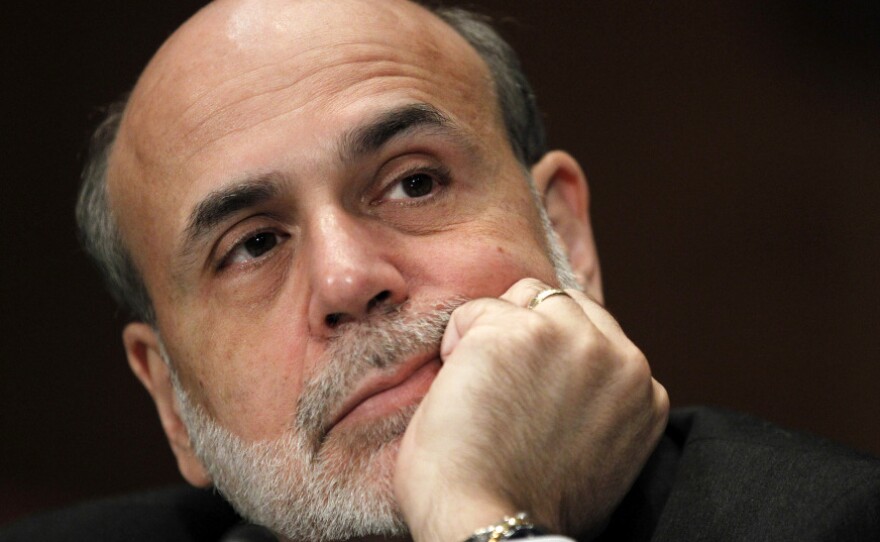In a new round of economic stimulus, the Federal Reserve on Wednesday announced it will buy hundreds of billions of government debt in a bid to further lower interest rates, which are already at historic lows.
The Federal Open Market Committee said it "intends to purchase a further $600 billion of longer-term Treasury securities by the end of the second quarter of 2011, a pace of about $75 billion per month."
This will be in addition to an expected $250 billion to $300 billion in purchases over the same period from reinvesting proceeds from its mortgage portfolio.
The idea behind this "quantitative easing" is for cheaper loans to get people to spend more and stimulate hiring. The Fed says it will review whether adjustments are needed depending on how the economy is performing.
Some worry the Fed action will do little to boost the economy because interest rates are already historically low. Others fear the bond purchases could drive inflation too high over the long term and unleash speculative buying in assets like stocks.
The financial markets, which had priced in the Fed's move for weeks, didn't move much after the announcement. The Dow Jones industrial average fell 26 points soon afterward.
In announcing the action, the Fed said the pace of the economy continues to be slow. Companies remain reluctant to hire, housing activity is depressed and consumers are increasing their spending only gradually.
Thomas Hoenig, president of the Federal Reserve Bank of Kansas City, dissented for the sixth straight meeting. He says the risks of the Fed's extra stimulus outweigh the potential benefits.
With the economy weak, the Fed doesn't want to take chances that it could get stuck in the kind of economic stagnation and deflation problems that gripped Japan and led to a "lost decade" during the 1990s.
Deflation is a widespread and prolonged drop in prices of goods and services, in wages and in the values of homes and stocks. Deflation makes it harder for people and companies to pay their debts, pushing up home evictions and bankruptcies.
Fed policymakers expressed disappointment that they haven't been able to reduce unemployment -- now at 9.6 -- and raise inflation to levels more in line with a healthy economy. Progress toward those goals has been disappointingly slow, the Fed acknowledged in its post-meeting statement.
The Fed has tried since the 2008 financial crisis to keep credit available to individuals and businesses. It's done so, in part, by keeping the target range for its bank lending rate near zero.
It also pursued the unorthodox strategy of buying long-term bonds. The Fed's purchases are so vast that they push down the rates on those bonds.
In 2009, the Fed bought $1.7 trillion in mortgage and Treasury bonds. Those purchases helped lower long-term rates on home and corporate loans. The program was credited with helping to lift the country out of recession.
The action comes one day after voters frustrated by unemployment, scant pay gains and soaring home foreclosures punished Democrats and handed control of the House to Republicans. Democrats kept control of the Senate.
The split will make it harder for President Barack Obama to enact any major economic initiatives. That could put more pressure on the Fed to get the economy back on firmer footing.
Once again, the Fed pledged to hold its key interest rate at a record low near zero for "an extended period."
The Fed Statement
"Information received since the Federal Open Market Committee met in September confirms that the pace of recovery in output and employment continues to be slow. Household spending is increasing gradually, but remains constrained by high unemployment, modest income growth, lower housing wealth, and tight credit. Business spending on equipment and software is rising, though less rapidly than earlier in the year, while investment in nonresidential structures continues to be weak. Employers remain reluctant to add to payrolls. Housing starts continue to be depressed. Longer-term inflation expectations have remained stable, but measures of underlying inflation have trended lower in recent quarters.
"Consistent with its statutory mandate, the Committee seeks to foster maximum employment and price stability. Currently, the unemployment rate is elevated, and measures of underlying inflation are somewhat low, relative to levels that the Committee judges to be consistent, over the longer run, with its dual mandate. Although the Committee anticipates a gradual return to higher levels of resource utilization in a context of price stability, progress toward its objectives has been disappointingly slow.
"To promote a stronger pace of economic recovery and to help ensure that inflation, over time, is at levels consistent with its mandate, the Committee decided today to expand its holdings of securities. The Committee will maintain its existing policy of reinvesting principal payments from its securities holdings. In addition, the Committee intends to purchase a further $600 billion of longer-term Treasury securities by the end of the second quarter of 2011, a pace of about $75 billion per month. The Committee will regularly review the pace of its securities purchases and the overall size of the asset-purchase program in light of incoming information and will adjust the program as needed to best foster maximum employment and price stability.
"The Committee will maintain the target range for the federal funds rate at 0 to 1/4 percent and continues to anticipate that economic conditions, including low rates of resource utilization, subdued inflation trends, and stable inflation expectations, are likely to warrant exceptionally low levels for the federal funds rate for an extended period.
"The Committee will continue to monitor the economic outlook and financial developments and will employ its policy tools as necessary to support the economic recovery and to help ensure that inflation, over time, is at levels consistent with its mandate."
Copyright 2022 NPR. To see more, visit https://www.npr.org. 9(MDAzMjM2NDYzMDEyMzc1Njk5NjAxNzY3OQ001))






